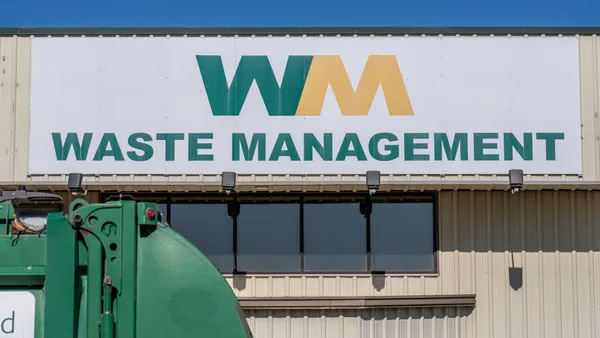Dive Brief:
- The National Waste and Recycling Association (NWRA) recently filed a petition with the Federal Motor Carrier Safety Administration (FMCSA) seeking an industry-wide exemption from rules requiring vehicles to use electronic logging devices (ELD).
- One reason for the request, according to NWRA, is that the industry doesn't have a record of Hours of Service (HOS) violations. Following the random selection of 20 companies over a two-year period, the NWRA claims to have found only one company with two HOS violations — both of which could likely be challenged on technicalities.
- Additionally, NWRA estimated that the financial impact of an ELD mandate would be $116.7 million over two years, not including possible fines, and called the potential financial burdens "devastating" for smaller companies. Because of the short average distances between stops along collection routes, NWRA also estimated that the number of times a driver would have to interact with an ELD would be distracting and pose safety risks.
Dive Insight:
This petition with FMCSA is separate from the ones NWRA previously filed with the U.S. Department of Transportation, including one supporting Waste Management's exemption request.
Now that Waste Management's request has been approved, some believe it's only a matter of time before some type of industry-wide policy is announced, since other companies doing similar work are at a competitive disadvantage. Republic Services, Waste Connections and others also filed comments in support of an exemption over the summer. In contrast, multiple national labor unions have filed comments in opposition to any such exemption due to its implications for shift lengths.
When it comes to distracted driving on a national level, the industry has begun to focus more on crashes caused by third-party drivers on their phones or other devices; industry drivers are less likely to cause similar incidents. The case could be made, however, that requiring haulers to interact with ELDs – in addition to existing in-cab technology – might create dozens of new distractions along each route.
Technology is playing an increasing role in collection vehicles, but some companies have differing views on its relationship to safety. Most agree that external devices, such as cameras and other sensors, are a net positive. These can make it easier for drivers to avoid incidents by, for instance, detecting oncoming traffic or backing into an alley with better visibility. Some debate remains about whether other devices that require more frequent interaction along a route are their own source of distraction. During this year's WasteExpo, Advanced Disposal Services CEO Richard Burke said in-cab devices are more dangerous than driver fatigue. Others believe they're important tools as long as drivers aren't using them while in motion.
It is still unclear how FMCSA will respond to NWRA's petition, although other industries have been given exemptions in the past. Adding further uncertainty to this issue is the fact that some state agencies are not enforcing ELD rules because of confusion at the federal level. The back and forth between government regulators and the industry will be critical to watch, especially for smaller operations that could take a significant financial hit if no exemption is granted.









